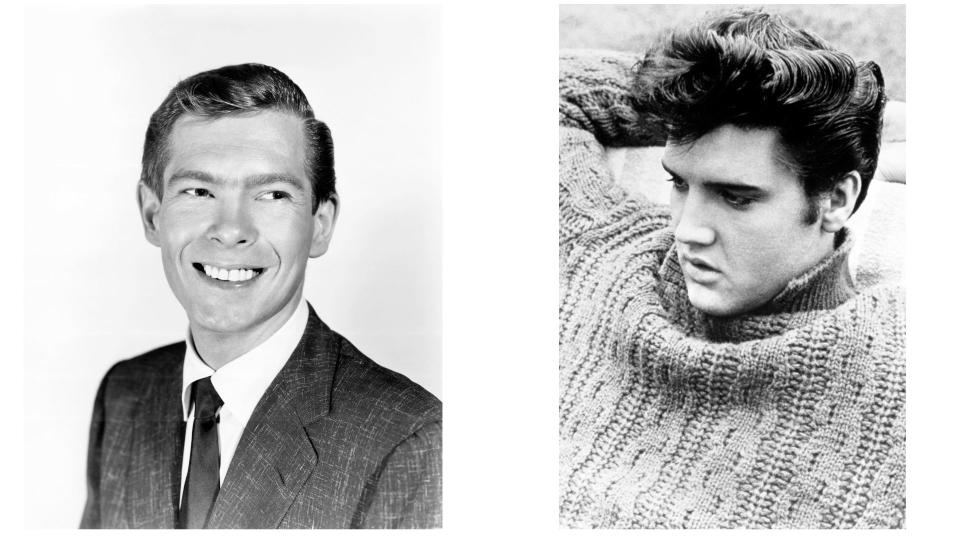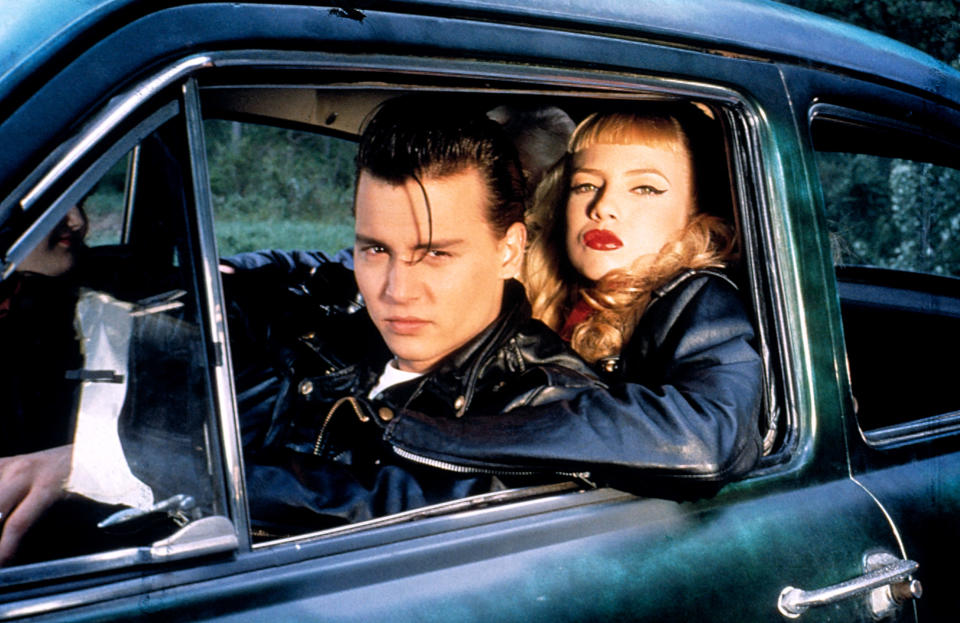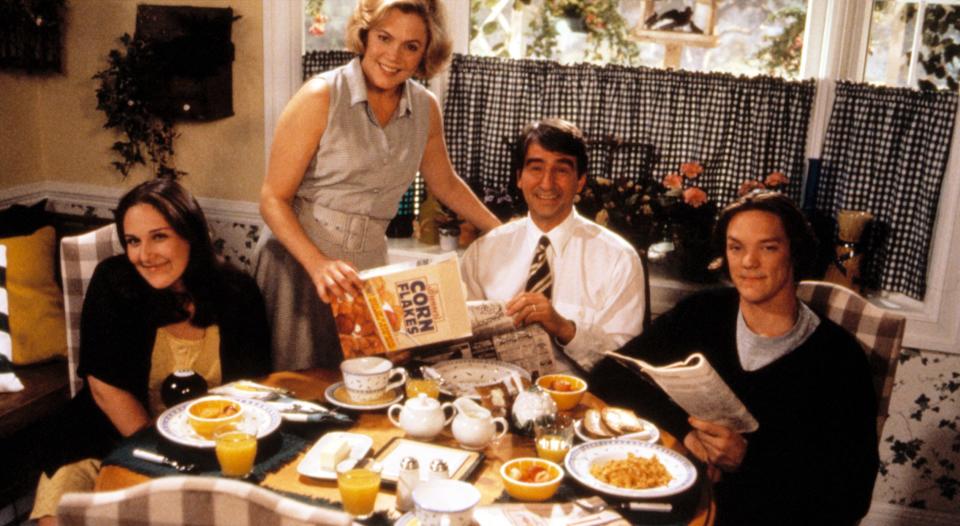What John Waters Believes in: ‘Cry-Baby,’ Johnny Depp, and the Best Corruption Happens at the Library

After John Waters made the once-improbable leap to the mainstream with “Hairspray,” a joyous film so devoid of filth that it was rated PG, he found himself in bizarre circumstances: He’d made a box-office success, a home-video smash, and his next film would be produced by Imagine Entertainment and released by Universal Pictures.
That film, the 1990 “Cry-Baby,” failed to duplicate the success of its predecessor, but it developed a cult following thanks in no small part to its star Johnny Depp. As such, the film’s popularity has earned it a 4K/Ultra HD reissue via Kino Lorber that will hit shelves May 28.
More from IndieWire
Waters was so excited about seeing his film receive this specialized treatment that he agreed to make the promotional rounds for its release. When IndieWire hopped on the phone with him, he detailed the origins of the film and his love of its music, discussed his faith that the musical version will eventually make it back to Broadway, and reconfirmed that so far no one is willing to pony up to make “Liarmouth” with Aubrey Plaza.
This interview has been lightly edited for clarity.
IndieWire: The first reason that I wanted to talk to you about the reissue of Cry-Baby is I recently had a chat with Dave Alvin, who detailed his work on the film’s soundtrack.
John Waters: Who?
Dave Alvin.
Oh, Dave Alvin, of course! All I heard was Alvin, and I thought you were talking about Alvin and the Chipmunks, and I was going, “That’s not this movie!” Yeah, Dave Alvin was great! We had real royalty working on this music for the movie, and I think they did an amazing job.
Absolutely. He told me in particular about how much he enjoyed the opportunity to write with Doc Pomus.
Yeah! The two of them, are you kidding? I mean, I grew up on the music of that era. I mean, “Cry-Baby” by the Bonnie Sisters was the very first record I ever bought in my life, and my parents hated it. And it was white girls singing it, but it was more, “Shooby-dooby-da, doo-wop…” So we did the… Rachel Sweet cover, right? I don’t have every credit in front of me. I should! But all the people who did the original music for the film totally knew where I was coming from. And I greatly respected them and was thrilled that the music supervisor, Becky [Mancuso], got them to do it.

Dave said in particular that you told him specifically that you were looking for “hillbilly bop,” and he said, “I felt like I was one of very few people who knew in an instant what he was talking about.”
Yeah, because this was… Like, “Hairspray” was 1963, right before the ’60s really happened, and “Cry-Baby” was right before rock ‘n’ roll happened. So in real life in that period, Frank Sinatra had just been put out of business by Johnnie Ray. It was a tiny window before Elvis changed everything. But, you know, the rockabilly, what was so amazing is that they sang black music by hillbillies, as they were called at the time, and country-western, and they put it all together. And today rhythm and blues singers are singing country. So it’s come full circle!
I’ve read somewhere that it was someone who lived in your neighborhood when you grew up who was the inspiration for the character of Cry-Baby.
Yeah, there was a guy across the street who the neighbors all thought was a juvenile delinquent. I made friends with the younger brother so I could spy on him. And I don’t know… I was thinking the other day, because another interviewer did ask me about it: He’s probably not alive, because he’s older than me, and I don’t think he looked like he was on the way to success… But I could be dead wrong! But I hung around with his younger brother, and it was the first time I ever played strip poker and smoked cigarettes. Not in a gay way. There wasn’t anything gay about it. Just teenage rebellion.
So what made you decide to transform that memory into a screenplay?
Because it was the first rebellion. I always say that the first thing that you are obsessed by and love that your parents hate, that’s when you begin your artistic career. And I always liked rebels. LIFE Magazine corrupted me. They taught me about beatniks, they taught me about bohemia, they taught me about drugs, they taught me about gay people… They taught me about everything that I wasn’t supposed to know about! So the library corrupted me… and a good library should be able to corrupt young people! I used to look up things that would say, “See librarian.” And I would steal the book. Because they wouldn’t give it to kids! Like Tennessee Williams’ stuff.
But I did really learn! I mean, I couldn’t ask my parents about some of these things, but if I went to the library, they thought, “Oh, he’s studying! Isn’t that great? He wants to go to the library!” Well, first of all, the library also had active bathrooms. In a gay world. Always it did in those days. Now, I didn’t say I was using it when I was in high school, but I knew what was going on there! So you had a gloryhole on top of it! I don’t think that happens too much today.

Did you always have an eye on Johnny Depp for the lead?
Yes! Johnny Depp was at the height of his career on “21 Jump Street,” he was on the cover of every teen magazine, he was Justin Bieber… and he hated it! So I always said to him, “Why do you hate it? That’s the point, to get so famous that you can never leave the house!” And he couldn’t then. He could not go out. When we were shooting the movie outside, hundreds of girls would be running and falling backward and crying. They tried to buy his sewage underneath his trailer from the Teamsters!
He wanted to change all that by making fun of it, in a good way. And I think he did make the right decision. We did help him change that. Then Tim Burton came in and everything changed. But I must admit, I’m the one who finally got to show Johnny “Edward Penishands” for the first time.
Was there ever any talk of Johnny doing his own singing, or was James Intveld someone you’d considered?
There was talk of it, and Johnny can sing. It’s just that we weren’t sure of that. And maybe I made the wrong decision there. But I didn’t as far as James Intveld, who I think is one of the… Well, he is Cry-Baby in real life! He still is, in a way. I think he’s an excellent, amazing singer. He sang in “A Dirty Shame,” he sang in “Cry-Baby”… So he was just absolutely amazing. Every time I’m with him, I can barely look at him, I’m so impressed.
Were you ever hesitant about bringing Rickie Lake into a second consecutive film?
No, I felt bad for her because she was such a star [in “Hairspray”] and here she wasn’t. But she got right into it. She was a team player. Everybody got along really well making that movie. When you saw that cast walking into a restaurant, people ran. They didn’t ask for our autographs. They’d see Iggy [Pop] and Joey Heatherton… They didn’t understand it. Even in the hotel, they were nervous. Iggy tells a story about how his per diem got stolen in the hotel. Which is so Baltimore.
It was the first real Hollywood movie I made. I mean, New Line with “Hairspray” was Hollywood, but this was Universal. This was Brian Grazer and Ron Howard, of all people! Who was actually lovely to me. I wrote about it in [my book] “Mr. Know It All,” the nightmare of what happens with test screenings and all that. I ended up putting out the movie I liked and it didn’t do well when it came out. Then after “Hairspray” became a giant hit musical on Broadway, [“Cry-Baby”] came out on Broadway, too… and it failed again!
But still, so many people come up to me and say, “It was the first movie of yours I saw,” whether they were 14 or 8 years old, “and it changed my life, because I knew something was wrong in it, but I didn’t know what, but I knew it was okay to be wrong!” Because of Johnny Depp, I always say that more people have seen that movie on television all over the world than any movie I’ve made, probably. But to this day, it’s never gone into profit! I’ve never made a nickel profit from that. But it still plays, and I’m proud of the movie. I think it holds up really well, and it probably plays way better today than it would’ve then. Amy Locane gives a brilliant performance. And no one ever does well at being an ingénue. I think she’s the only ingenue who was ever in a John Waters movie, really. You really couldn’t call Mary Vivian Pearce an ingenue.
You mentioned Iggy a minute ago. Somehow you managed to make him look even more gaunt than he already is.
Well, he loves to look like that. The older he gets, the nuder he is. I think his interview [for the new Blu-ray] was absolutely lovely. I’ve stayed in touch with Iggy, and what a great career. I mean, the ultimate punk, but a gentleman and just a true star. He and Debbie Harry. What can I say? Those two are just royalty. And they had a sense of humor about themselves.
Well, I’ll just say that the scene with him taking a bath… It’s unforgettable. On a lot of levels.
That was stolen completely from a Bob Mizer gay porn book, where he did all of that pin-up stuff from all the hustlers in L.A.. There’s a picture of someone right in a barrel that I totally stole it from. But when I showed those pictures to the studio when I was getting the deal, I didn’t tell them where they were from. And you couldn’t see any nudity.
Kim McGuire was definitely a discovery.
Yeah, she was. Bless Kim. She died, sadly. But if you look at the footage, at the interviews they did with her, I wouldn’t have ever recognized her! She looked completely different. Now, of course she didn’t look like that in real life. We always called Van Smith “the ugly expert” and he came in and drew everything on in the most hideous possible way. But she totally embraced it. She was not vain and went completely the other way, with a great sense of humor.
Who would you say was your favorite piece of casting for that film?
Oh, I would never say anyone but Johnny Depp. Because he got the movie made! Are you kidding? He always used to say to me, “You got me a million dollars?!” Because that’s what he got to make that movie. Which was so crazy. We’d never had that kind of budget. The first day on the set, you’re saying, “Oh, my God, we have food?” It was an amazing experience for everybody. And it rained every day, so it was a hard movie to make. AEven today when I looked at this new print, I think, “How did we ever make that movie?” The action scenes… How did we ever do that? But it was just team players, like it’s always been. When they come with me, they go all the way. They give it the whole thing, everybody down to the Teamsters. There were even John Waters Teamsters in Baltimore, who only did my movies! They played poker with Polly Bergen through the whole movie.
I was very surprised to see Willem Dafoe in the film. I’d completely forgotten that he was in there.
Oh, yeah! And he was great. I’m going to tell you this story, but I’ve told other people. But it’s a good one! I was in Poland last year doing my show, totally huge sold-out audience, and one of the questioners was this older man that looked like Nikita Khrushchev. Basically, he was an old Communist. He said he was there before everything, when it was a Communist country, but somehow when he was a kid they got an illegal print of Cry-Baby. And he said, “When I saw Willem Dafoe slap Johnny Depp on the ass, I knew I was gay!” And the whole audience went crazy… because that was not what anybody expected he was gonna say! And I went right and called Willem and told him. And he was proud.
Is there still any talk of trying to do a Pink Flamingos opera?
A long time ago there was. Recently somebody asked about it, but nothing came of it. So who knows? But I think it would be a good one. You know, the fat lady sings at the end and eats shit! It’d definitely be a good opera, because operas are about excesses and they’re overdramatic, so a battle of filth done as an opera would be amazing!

Similarly, will we ever see a sequel to Serial Mom?
Not a sequel. But there’s been talk of it being a TV show, which I think would work best, because if it built to a kill once a month… And with political correctness being what it is, it’s perfect! She’d just kill for political correctness! If you look at that movie it was obviously my parody of true-crime movies, but nobody had really done that. And now you look and… Well, there’s stuff in there that’s just like the O.J. case, which hadn’t happened yet! I think “Serial Mom” is my best movie, we had the most money, Kathleen Turner is fabulous, and I think everybody’s great in it.
My films, they don’t go away. Even if you hate ’em! And that’s thanks to Criterion, that’s thanks to all of these great art theaters that are left around the country — the few! — and to young people, who really have discovered them. Because you can’t get away with just your original audience. You have to keep getting the next generation. Luckily, I have. And I think [that’s] because I’m not mean and I make fun of things that I like. I’m always making fun of whatever are the politically correct rules that we live by, not our parents.
I have to ask: Is there any update on the status of “Liarmouth”?
I’m not going to… [Starts to laugh.] Every time I comment on that, some article comes out that causes me hell, saying we’re making the movie. I’ll say it one more time, and there is no scoop here, there’s nothing new I’m telling you, but… [Village Roadshow] optioned the book, I wrote the script, they liked it, Aubrey [Plaza] likes the script, wants to be in it, I want her to be in it, and every person said, “No, we don’t have a penny of the budget.” That is where it is today. Hopefully that will change. But the answer as of today? That’s it.
Best of IndieWire
Every Palme d'Or Winner from the Cannes Film Festival, Ranked
The 13 Best Thrillers Streaming on Netflix in May, from 'Fair Play' to 'Emily the Criminal'
The Best Father and Son Films: 'The Tree of Life,' 'The Lion King,' and More
Sign up for Indiewire's Newsletter. For the latest news, follow us on Facebook, Twitter, and Instagram.
